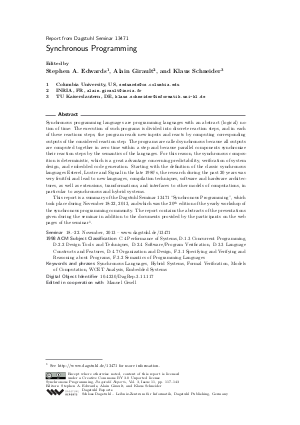Synchronous Programming (Dagstuhl Seminar 13471)
Authors Stephen A. Edwards, Alain Girault, Klaus Schneider and all authors of the abstracts in this report
-
Part of:
Issue:
Dagstuhl Reports, Volume 3, Issue 11
Part of: Volume: Dagstuhl Reports, Volume 3
Part of: Journal: Dagstuhl Reports (DagRep) - License:
 Creative Commons Attribution 3.0 Unported license
Creative Commons Attribution 3.0 Unported license
- Publication Date: 2014-03-17
File

PDF
DagRep.3.11.117.pdf
- Filesize: 0.84 MB
- 27 pages
Document Identifiers
Subject Classification
Keywords
- Synchronous Languages
- Hybrid Systems
- Formal Verification
- Models of Computation
- WCET-Analysis
- Embedded Systems
Metrics
- Access Statistics
-
Total Accesses (updated on a weekly basis)
0Document
0Metadata
Abstract
Synchronous programming languages are programming languages with an abstract (logical) notion of time: The execution of such programs is divided into discrete reaction steps, and in each of these reactions steps, the program reads new inputs and reacts by computing corresponding outputs of the considered reaction step. The programs are called synchronous because all outputs are computed together in zero time within a step and because parallel components synchronize their reaction steps by the semantics of the languages. For this reason, the synchronous composition is deterministic, which is a great advantage concerning predictability, verification of system design, and embedded code generation. Starting with the definition of the classic synchronous languages Esterel, Lustre and Signal in the late 1980's, the research during the past 20 years was very fruitful and lead to new languages, compilation techniques, software and hardware architectures, as well as extensions, transformations, and interfaces to other models of computations, in particular to asynchronous and hybrid systems. This report is a summary of the Dagstuhl Seminar 13471 "Synchronous Programming", which took place during November 18-22, 2013, and which was the 20th edition of the yearly workshop of the synchronous programming community. The report contains the abstracts of the presentations given during the seminar in addition to the documents provided by the participants on the web pages of the seminar.
Cite As Get BibTex
Stephen A. Edwards, Alain Girault, and Klaus Schneider. Synchronous Programming (Dagstuhl Seminar 13471). In Dagstuhl Reports, Volume 3, Issue 11, pp. 117-143, Schloss Dagstuhl – Leibniz-Zentrum für Informatik (2014)
https://doi.org/10.4230/DagRep.3.11.117
BibTex
@Article{edwards_et_al:DagRep.3.11.117,
author = {Edwards, Stephen A. and Girault, Alain and Schneider, Klaus},
title = {{Synchronous Programming (Dagstuhl Seminar 13471)}},
pages = {117--143},
journal = {Dagstuhl Reports},
ISSN = {2192-5283},
year = {2014},
volume = {3},
number = {11},
editor = {Edwards, Stephen A. and Girault, Alain and Schneider, Klaus},
publisher = {Schloss Dagstuhl -- Leibniz-Zentrum f{\"u}r Informatik},
address = {Dagstuhl, Germany},
URL = {https://drops.dagstuhl.de/entities/document/10.4230/DagRep.3.11.117},
URN = {urn:nbn:de:0030-drops-44395},
doi = {10.4230/DagRep.3.11.117},
annote = {Keywords: Synchronous Languages, Hybrid Systems, Formal Verification, Models of Computation, WCET-Analysis, Embedded Systems}
}
